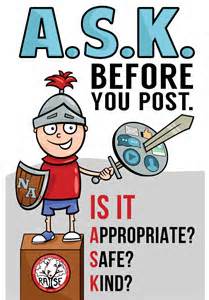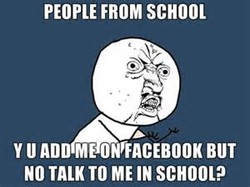
Adolescence is the 2nd fastest growth period of a person's life (after infancy). Due to all of these rapid changes, teenagers are especially prone to rely on and misuse social media.
Why?????
- No matter what genetics a teen may possess, they are impressionable and adding social media to the already prevalent peer pressure only ramps that pressure up further.
- Self-disclosure is strongly associated with increased activation in brain regions that form the mesolimbic dopamine system, including the nucleus accumbens and ventral tegmental area.
- The immediacy and reward associated with social media (especially through mobile avenues) can be thought of as a 'quick hit' and would be expected to result in a minority of users experiencing 'addiction-like' symptoms.
- Egocentric – Its about me, me, me
- Highly Curious about the "Real World"
- Prefer Active Learning to Passive
- Moving from Concrete to Abstract thinking
The following information is not meant to be scary. The information is provided for 1) awareness, 2) guidance, 3) tips.

· In 2009, 22% of teenagers log on to their favorite social media site more than 10 times a day. In 2014, 70 percent of teenagers age 12 to 17 spend time on a social media site in a typical day. In 2015, 93% of teens use social media daily.
· More than 50% of adolescents log on to a social media site more than once a day.
· 75% of teens own cell phones
· Studies indicate that family involvement in children's education steadily decline as their children move from elementary school through middle and high school(Epstein, 1986; Epstein & Dauber, 1991)
· Family involvement in education helps produce increases in student attendance, decreases in the dropout rate, and improvement in student attitudes and behavior (Rich, 1987; Sattes, 1988)

- Because tweens and teens have a limited capacity for self-regulation and are susceptible to peer pressure, they are at some risk as they engage in and experiment with social media
- Some young people find the lure of social media difficult to resist, which can interfere with homework, sleep and physical activity.
- Young people can harm their reputations and safety by posting personal and inappropriate information. And information about sites they visit may be captured and used to target them with advertising.
- Negative body image and poor self-esteem increases
- Those that interact via social media on a daily basis are 5 times likelier to use tobacco, 3 times likelier to use alcohol, and 2 times as likely to use marijuana.
- cyberbullying and online harassment
- sexting - pictures or words
- “Facebook depression” - this is the phenomenon that occurs when an individual does not receive instant gratification from someone (anyone!) "liking" or commenting on a post. Even negative responses are preferred to no response. (Can you say SCARY??)
- lower school grades
- Advice and guidance from peers, not adults.
- Encouragement from peers to engage in self-harm (cutting, drugs, sex, suicide attempts, risk-taking behaviors).

- Help develop improved technology skills
- In moderation, social media can be a great way for teens to connect to others, discuss shared interests, to relate to their peers, and to express themselves
- Learn about people with varied backgrounds
- Enhance their creativity by sharing musical and artistic projects
- Expand their ideas by creating blogs, videos, and podcasts
- Collaborate on school projects outside of class

- Supervise online activities via active participation and communication with child, in addition to using technology monitoring software
- BE AVAILABLE: SET UP PRIVATE TIME
- Utilize family meetings and family dinners without technology
- Teach online etiquette
- Be media savvy – know who your child’s “friends” are, know the apps and websites, become their “friend”
- ORGANIZATION AND GUIDANCE IS NEEDED
- Be Available: Encouragement not Praise
- Set Clear Logical Values-driven Rules. Be tolerant and patient, but not a doormat
- Set limits – amount of time per day/time to shut off all electronics at night/rules for using technology
- Make Smart Phone agreement, such as “no phones in bedroom after ____(time)” and “no downloading apps without permission.”
- Make sure your teen uses privacy settings that limit access to who can view her online profile.
- Have your teen limit friends to people she actually knows, not strangers; review her friend list.
- Help your teen create a safe screen name that won’t reveal identifying personal information, such as where she lives, gender, or age.
- Explain to your teen why some things, such as telephone numbers, addresses, and financial information, should stay private.
- Listen to their Fears and concerns without judgments -- If they don't talk to you, they might be getting bad advice online -- Yikes!
- Know the friends-Space but not too much!
- Help them become independent, but give them a sense of belonging
- It’s only partly hormones
- Unconditional Love is paramount
- Set Rules based on your Values and Morales
- Punish the behavior (correction not anger)
- Be Consistent and Loving
- Know the School Rules
- Teach your Child good decision making skills
- Be familiar with their friends and hangouts
- Know about what they read, see, listen and interact
- Teach them to be safe
- Seek out resources (other parents, counselors, teachers)
Resources:
www.teensafe.com ($15/month is monitor all communication on child’s phone)
www.netsmartz.org (tips and videos for parents and kids)
www.dosomething.org/facts/11-facts-about-sexting (tip sheet)
School Counselor and/or professional counselors
Children’s Healthcare of Atlanta – PowerPoint on Social Media Tips
*******************************************************************************************************************************************
Contact: Schedule an initial session with Bree today for more parenting guidance. Bree Winkler is a licensed professional counselor and school counselor in Atlanta, GA.
 RSS Feed
RSS Feed